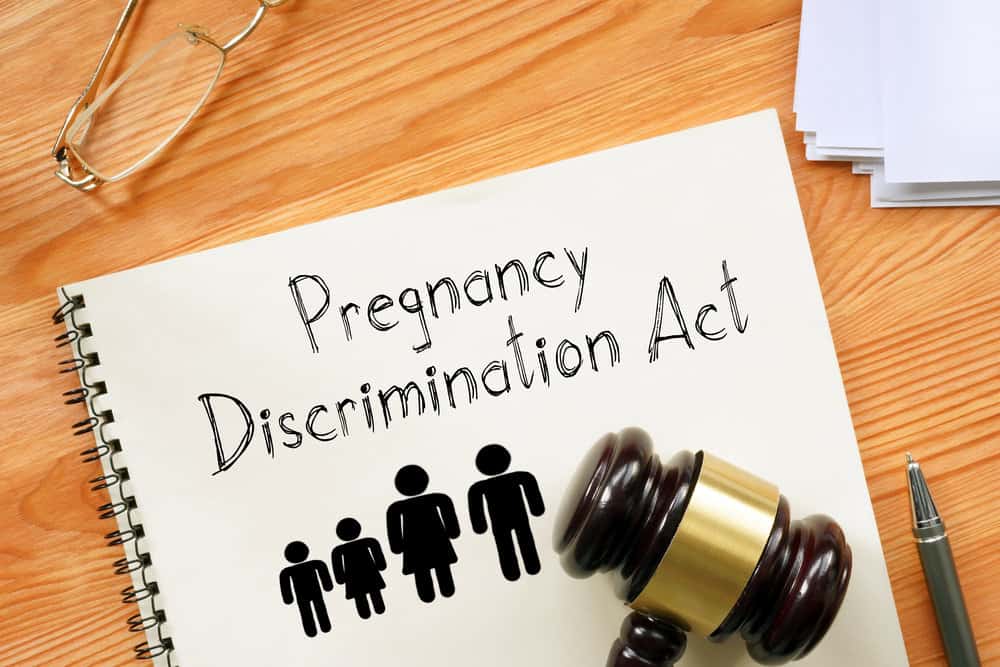Working while pregnant can pose a challenge for many women. It’s important to know your rights and protect yourself from any unlawful discrimination. This article will provide legal insights on pregnancy discrimination and equip you with the necessary knowledge to safeguard your job security.
Pregnancy discrimination refers to treating a woman unfavorably because of pregnancy, childbirth, or a medical condition related to either of those circumstances. Employees and employers must understand this concept and the legal rights and protections to ensure that pregnant women are not treated unfairly.
If you suspect that you are experiencing pregnancy-related discrimination in your workplace, it is important to take the necessary steps to protect yourself and assert your rights. This may include learning about maternity leave and benefits, understanding your employer’s role in preventing discrimination, and seeking legal help.
Key Takeaways
- Pregnancy discrimination is illegal and refers to unfavorable treatment due to pregnancy, childbirth, or related medical conditions.
- Understanding your legal rights and protections can help protect you against pregnancy discrimination in the workplace.
- Taking appropriate steps, such as learning about maternity leave benefits and seeking legal help, can further protect you.
Understanding Pregnancy Discrimination
Pregnancy discrimination occurs when an employer treats pregnant employees unfairly because of their pregnancy, childbirth, or medical conditions related to pregnancy. The Equal Employment Opportunity Commission (EEOC) enforces anti-discrimination laws such as the Pregnancy Discrimination Act, a federal law specifically targeting pregnancy discrimination.
This act falls under sex discrimination and aims to protect pregnant employees from unfavorable treatment. For example, if you’re pregnant, your employer cannot refuse to hire or promote you, fire you, or force you to take maternity leave solely because of your pregnancy.
In addition to the federal laws, state-level anti-discrimination laws protect pregnant workers. These laws may vary, but they usually mandate employers to provide reasonable accommodations to pregnant employees, such as modifying work schedules, providing lighter duties, or granting additional breaks.
Employers are also obligated to offer maternity leave in accordance with the Family and Medical Leave Act (FMLA), which allows eligible employees to take up to 12 weeks of unpaid leave for childbirth or adoption. Remember, it’s illegal for your employer to retaliate or discriminate against you for requesting or taking maternity leave.
Regardless of your position or industry, you must know your rights as a pregnant worker. Knowledge is power, so knowing your rights and protections under pregnancy discrimination laws will help ensure that you are treated fairly during this crucial time in your life.
Key takeaways:
- Pregnancy discrimination is illegal under federal and state laws, including the Pregnancy Discrimination Act
- Employers are supposed to provide reasonable accommodations for pregnant workers
- Taking maternity leave is protected under the Family and Medical Leave Act, and employers cannot discriminate against employees for using it
- Stay informed about your rights under pregnancy discrimination laws to protect yourself from unfair treatment.
Legal Rights and Protections in the United States
In the United States, federal law offers various rights and protections for pregnant employees. The Pregnant Workers Fairness Act is being pushed to provide reasonable accommodations to pregnant individuals.
Under the Americans with Disabilities Act (ADA), pregnancy-related complications are considered disabilities, entitling you to certain reasonable accommodations at work. It ensures employers with 15 or more employees consider accommodations such as modified work schedules, additional breaks, or even temporary job reassignments.
Another vital law is the Federal Pregnancy Discrimination Act (PDA), which prohibits employers with 15 or more employees from discriminating against pregnant individuals in all aspects of employment, including hiring, firing, and promotions.
As a pregnant worker, you might also be eligible for leave under the Family Medical Leave Act (FMLA). It allows eligible employees to take up to 12 weeks of unpaid, job-protected leave for pregnancy, childbirth, or related medical conditions.
In addition to federal laws, state and local laws protect pregnant workers. For example, California has the California Family Rights Act (CFRA), which gives eligible employees up to 12 weeks of job-protected leave for pregnancy, childbirth, and bonding with a newborn. The California Civil Rights Department (CRD) enforces these regulations.
Key takeaways:
- Federal laws like the ADA, PDA, and FMLA provide protections and accommodations to pregnant workers.
- State and local laws may offer additional protections depending on your location, such as those protected by the California Family Rights Act and enforced by the CRD.
Potential Consequences of Pregnancy Discrimination
Being fired for being pregnant is not only unethical, but it is also a violation of the law. Employers cannot legally terminate an employee due to pregnancy, and doing so can result in severe consequences for employers. Let’s discuss some of the potential outcomes that can arise from pregnancy discrimination:
- Termination: If you are fired for being pregnant, it is important to consult with a legal professional to seek advice on how to proceed. You may be able to file a complaint with the proper authorities and potentially regain your job or receive compensation for your wrongful termination.
- Undue hardship: If your employer attempts to argue that accommodating your pregnancy creates undue hardship, they must be able to prove it. This may involve demonstrating the company’s financial and operational difficulties, which is typically very challenging for employers to prove.
- Redundancy: Sometimes, employers may try to claim redundancy as a reason for terminating a pregnant employee. However, if the real reason behind the termination is pregnancy discrimination, there may be legal grounds for you to file a complaint.
- Pay and benefits: If you have been discriminated against due to your pregnancy, you might be entitled to compensation for lost pay and benefits. This includes any raises, bonuses, or other benefits you missed due to the discrimination.
- Retaliation: Retaliation against an employee for filing a complaint about pregnancy discrimination is illegal. If you feel you have experienced retaliation for lodging a complaint, seeking legal advice and reporting the incident is crucial.
- Reasonable accommodations: Pregnant employees can request reasonable accommodations for their condition. This includes taking frequent breaks, limiting heavy lifting, or providing a modified work schedule. Employers are required to provide these accommodations unless it causes undue hardship.
In summary, employers face potentially severe legal and financial consequences for engaging in pregnancy discrimination. Should you experience such discrimination, it is important to seek legal advice and remember your rights to request reasonable accommodations and to be protected from retaliation for reporting discrimination claims.

Steps to Take if Facing Pregnancy Discrimination
If you believe you’ve been a victim of pregnancy discrimination, it’s important to know your rights and the steps you should take to protect yourself. Here are some key actions you can take if you find yourself in this situation.
1. Document the evidence: Keep a detailed record of the incidents, including dates, witnesses, and any remarks made by your employer. This is vital for building a strong case if you pursue legal recourse.
2. File a complaint with the EEOC: You have a right to file a complaint with the Equal Employment Opportunity Commission (EEOC). They can investigate the matter and grant you a “right to sue” letter, allowing you to pursue a lawsuit against your employer. You cannot file in federal court without the right to sue letter.
3. Consult an employment law attorney: Speaking with an experienced employment attorney can help you understand your rights and the best course of action. They can guide you through the legal process and advise you on potential remedies, such as lost wages or reinstatement.
4. Be mindful of the statute of limitations: There is a time limit for filing a complaint with the EEOC or pursuing a lawsuit, so it’s important to act promptly. In most cases, the statute of limitations is 180 days from the date of the discriminatory act.
5. Know your legal recourse options: If your attorney believes you have a strong case, they may recommend filing a lawsuit against your employer. If successful, you may be awarded damages for lost wages, emotional distress, and possibly reinstatement to your job.
To sum it up, if you face pregnancy discrimination at work, it’s important to:
- Document the evidence
- File a complaint with the EEOC
- Consult an employment law attorney
- Be mindful of the statute of limitations
- Know your legal recourse options
Taking these steps can help protect your rights and seek justice if you are unfairly treated due to your pregnancy. Maintain a friendly tone throughout your interactions with your attorney, the EEOC, and any other involved parties, as this will support a positive outcome in your case.
Pregnancy and the Workplace: Maternity Leave, Benefits and More
Understanding your rights and benefits is crucial when navigating pregnancy and the workplace. In the United States, maternity leave is typically covered under the Family and Medical Leave Act (FMLA). This act allows you to take up to 12 weeks of unpaid leave per year for various medical and family-related reasons, including the birth and care of your newborn.
FMLA: The FMLA ensures that your job is secure during your leave, meaning you cannot be fired for taking this time off. To be eligible, you must work for a company with 50 or more employees and have completed at least 1,250 work hours within the previous 12 months. Remember that this leave is unpaid, meaning you must plan your finances accordingly.
Paid Leave and Additional Benefits While the FMLA offers job security and unpaid leave, some states and employers provide additional benefits, such as paid leave. For example, California, New Jersey, Rhode Island, and New York have paid family leave programs. Depending on your employer, you might also access short-term disability benefits, which can provide income during pregnancy and maternity leave.
Physical Accommodations and Breastfeeding Under the Pregnancy Discrimination Act, your employer must make reasonable accommodations for pregnancy-related physical limitations. Additionally, federal law grants breastfeeding mothers the right to have a private, non-bathroom space and reasonable break times to express breast milk during the first year of their child’s life.
Job Security and Hiring Remember that employers cannot discriminate against you because of your pregnancy. This means they cannot refuse to hire or promote you, reduce your hours, lower your pay, or treat you differently from other employees just because you are pregnant.
In conclusion, knowing your rights and available benefits can help ensure a smooth and worry-free transition into motherhood. Don’t hesitate to speak with your employer or consult legal experts if your rights have been violated.
Understanding At-Will Employment and Pregnancy Discrimination
When discussing the possibility of being fired for pregnancy, knowing the difference between at-will employment and pregnancy discrimination is essential. At-will employment means that both the employer and the employee have the right to terminate the employment relationship at any time, for any reason, with or without cause, as long as it’s not for an illegal reason.
That being said, firing someone due to pregnancy falls under pregnancy discrimination, which is illegal under federal and state laws. The federal Pregnancy Discrimination Act (PDA) protects employees from being discriminated against because of pregnancy, childbirth, or related conditions. This means employers cannot base their decision to terminate your employment solely on your pregnancy.
If you’re an at-will employee, you might worry about being terminated without any specific reason. However, employers cannot use pregnancy as a pretext for termination. Suppose they try to dismiss you for poor performance or any other seemingly valid reason. In that case, they must be able to provide evidence of the issues that led to the termination decision.
To protect yourself from pregnancy discrimination:
- Be aware of your rights under the PDA and state laws
- Keep records of your job performance before and during your pregnancy
- Document any instances of pregnancy discrimination or other mistreatment
Remember, while at-will employment allows flexibility for employers and employees, it doesn’t negate your legal rights under the PDA and other anti-discrimination laws. Stay informed and seek legal advice if necessary.
Key Takeaway: At-will employment means your employer can terminate your employment for any reason, but not for illegal reasons, such as pregnancy discrimination. Understand your rights under the PDA and state laws, and document your job performance and any instances of discrimination.
The Role of Employer in Preventing Pregnancy Discrimination
As an employer, you are crucial in preventing workplace pregnancy discrimination. Understanding the protections for pregnant employees and fostering a fair and inclusive work environment is important. Here are a few key points to consider:
- First, familiarize yourself with the laws and regulations regarding pregnancy discrimination, such as the Pregnancy Discrimination Act (PDA) and the Family and Medical Leave Act (FMLA). These laws prohibit employers from treating pregnant employees differently than non-pregnant employees in similar conditions of employment, including hiring, promotions, and benefits.
- Make sure that your company policies are in line with the law. Review and update your hiring practices, employee handbook, and standard operating procedures to ensure they all provide equal opportunities for pregnant employees. Train your HR team, managers, and supervisors on the requirements and expectations related to these policies.
- Be proactive in providing reasonable accommodations for pregnant employees. This can include modifying work hours, granting medical leave, or adjusting job duties to ensure their health and safety. Engaging in an interactive process with the employee is important to determine the most appropriate accommodation for their needs.
- Communicate openly with your pregnant employees about their rights and any specific concerns they may have. Encourage a culture of open dialogue within your workforce to help address any issues or questions.
- Monitor workplace operations to ensure that pregnant employees are treated fairly and consistently. Regularly evaluate performance reviews, promotions, and layoffs to ensure no discrimination based on pregnancy status.
Key takeaways:
- Understand and comply with laws and regulations regarding pregnancy discrimination (PDA, FMLA).
- Update company policies to align with legal requirements.
- Provide reasonable accommodations for pregnant employees and engage in an interactive process.
- Encourage open communication with pregnant employees and create a culture of fairness.
- Monitor workplace operations, reviews, promotions, and layoffs to prevent discrimination.
The Impact of Pregnancy Discrimination on Women
When you are pregnant, it should be a time of joy and anticipation. However, being a victim of pregnancy discrimination can leave you feeling stressed and vulnerable. This section will explore pregnancy discrimination’s negative effects on women and their babies.
Pregnancy discrimination creates a hostile work environment with lasting physical and mental health consequences for the pregnant worker and her baby. When you are subjected to constant stress and worry, it may result in high blood pressure, difficulty sleeping, and increased anxiety – all factors that can negatively affect the healthy development of your baby.
Moreover, experiencing pregnancy discrimination can have a detrimental impact on your career development. Your professional reputation and financial stability can be jeopardized when denied opportunities for promotion, given less desirable assignments, or even fired. This can translate to difficulties in providing adequate care and resources for your growing family.
The emotional toll on pregnant workers facing discrimination cannot be overstated. The unfair treatment and sense of isolation can lead to feelings of depression and low self-esteem. These negative emotions harm your mental health and interfere with your ability to bond with and care for your baby.
The ripple effects of pregnancy discrimination extend to friends and colleagues as well. Witnessing discrimination in the workplace can create tension and unease among co-workers, resulting in reduced morale and productivity. This can exacerbate an already negative environment for you, further impacting your well-being.
In summary, pregnancy discrimination can have serious consequences for women and their babies, affecting their:
- Physical and mental health
- Career development and financial stability
- Emotional well-being
- Workplace relationships
Always be vigilant and know your rights as a pregnant worker to protect yourself and your baby from harmful workplace discrimination.
Signs It’s Time to Consider Legal Action for Pregnancy Discrimination
If you’re pregnant and navigating the workplace, the last thing you should worry about is discrimination. Yet, sometimes, knowing when to seek legal help can be murky. Here are some signs that may indicate it’s time to take legal action:
Unexplained Changes in Job Role or Responsibilities
If your responsibilities are suddenly scaled back, or you find yourself shifted to less desirable projects without clear justification, it could be a sign of discrimination.
Exclusion from Meetings and Opportunities
Being systematically excluded from important meetings, training sessions, or opportunities for advancement might indicate that your employer treats you unfairly because of your pregnancy.
Negative Performance Reviews After Announcement
If you suddenly start receiving negative evaluations or feedback that directly contradicts your prior performance history post-pregnancy announcement, it’s a red flag.
Denied Maternity Leave or Benefits
Failure to grant entitled maternity leave or withholding benefits such as health insurance during your pregnancy can clearly violate your rights.
Verbal or Written Discriminatory Comments
Any derogatory comments about your pregnancy, potential for maternity leave, or abilities to perform tasks due to pregnancy should be taken very seriously.
Repeated Ignorance of Accommodation Requests
If you’ve requested reasonable accommodations related to your pregnancy, such as more frequent breaks or a more ergonomic workspace, and are consistently ignored or denied, it’s a concerning sign.
Sudden Job Termination or Demotion
If you are terminated or demoted with little to no explanation following the announcement of your pregnancy, you may have a strong discrimination case.
Hostile Work Environment
Persistent harassment, insensitive jokes about your condition, or any actions that create a hostile or uncomfortable work environment can be grounds for legal action.
If you encounter any of these signs, it’s advisable to document incidents and consult a legal expert to assess your situation and recommend appropriate steps. Legal action is a serious path but could be essential for safeguarding your rights and job security.
How to Take Action: Your Options
When considering legal action, it’s important to have trustworthy and convenient options available. Labor lawyers will investigate and possibly take your case on a contingent-fee basis requiring no out-of-pocket costs (or fees) to you unless and until you win your case.
Going Pro-Se: Representing Yourself
Self-representation is challenging but doable if you’re well-prepared and knowledgeable about legal statutes and procedures.
Acting quickly but wisely to protect your rights and job is important. Navigating legal waters can be intricate, but with these trusted resources, you’re better equipped to steer the ship confidently. Take action with the insight you need; remember, you’re not alone on this journey.
 Frequently Asked Questions
Frequently Asked Questions
Is pregnancy protected under EEOC guidelines?
Pregnancy is protected under the Equal Employment Opportunity Commission (EEOC) guidelines. The Pregnancy Discrimination Act (PDA) prohibits employers from discriminating against workers based on pregnancy, childbirth, or related medical conditions. If you’re pregnant or planning to become pregnant, you’re protected under this law.
Key takeaway: Pregnancy is protected under EEOC guidelines.
Are there ADA accommodations for expectant mothers?
The Americans with Disabilities Act (ADA) may offer accommodations for expectant mothers. Although pregnancy is not officially considered a disability, complications or health issues may qualify for ADA protection. These accommodations could encompass temporary job modifications, flexible schedules, or adjusted work conditions.
Key takeaway: Expectant mothers may be eligible for ADA accommodations depending on pregnancy complications or health issues.
Do high-risk pregnancies have additional workplace protections?
High-risk pregnancies may qualify for additional protection under the ADA, as mentioned above. If a healthcare provider deems your pregnancy high-risk, you might be entitled to reasonable accommodations or modifications to work conditions.
Key takeaway: High-risk pregnancies could receive additional workplace protections under the ADA.
How do pregnancy work restrictions vary by state?
Pregnancy work restrictions may differ from state to state. Some states offer more robust protection than the federal PDA or ADA. Always research your state’s specific pregnancy-related workplace laws and consult legal counsel when necessary.
Key takeaway: Check your state’s laws for specific pregnancy work restrictions.
Are pregnant women protected from dismissal for pregnancy-related absences?
Pregnant women are often protected from dismissal due to pregnancy-related absences. The Family and Medical Leave Act (FMLA) provides eligible employees with up to 12 weeks of unpaid leave for pregnancy, childbirth, or related health conditions. Furthermore, employers should treat pregnancy-related absences like any other medical leave.
Key takeaway: Pregnant women are generally protected from dismissal for pregnancy-related absences under FMLA.
Can I face pregnancy discrimination when starting a new job?
Unfortunately, pregnancy discrimination can occur during the job application, but it’s illegal. Employers cannot discriminate against candidates based on pregnancy, childbirth, or related medical conditions. If you have faced discrimination while applying for a new job, consider contacting a lawyer or the EEOC.
Key takeaway: Pregnancy discrimination during the job application is illegal, but it can still happen.






